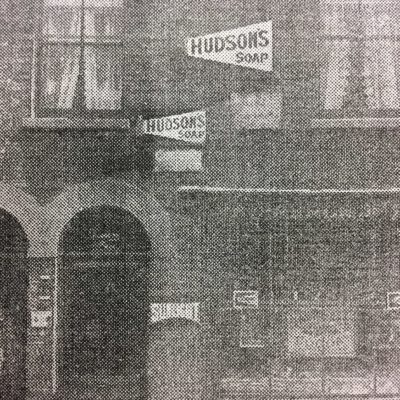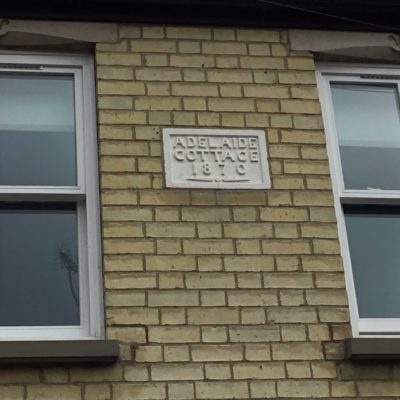Search by topic
- archaeology
- Building of Local Interest
- charity
- church
- crime
- dressmaker
- fire
- Great Eastern Railway
- Listed building
- Mapping Relief
- medieval
- oral history
- poverty
- Public House
- Rattee & Kett
- Religious House
- Roman
- scholar
- school
- Then and Now
- tudor
- women
- work
- world war one
- world war two
Search by text
51 Ainsworth Street
Two Railway Firemen and two Pensisoner sisters
Number 51 is one of a terrace of four houses on the west side of Ainsworth Street.
1881 census
John T Wilson, head, 30, fireman on GER, b. Newmarket, Cambridgeshire
Harriet J Wilson, wife, 38, b. Cherryhinton, Cambridgeshire
Rebecca S Wilson, daughter, 4, b. Cambridge
William T Wilson, son, 2, b. Cambridge
Gertrude J Wilson, daughter, 4 months, b. Cambridge
1891 census
Frederick H Allen, head, 31, railway fireman, b. Wisbech, Cambridgeshire
Sarah Allen, wife, 36, b. March, Cambridgeshire
George H Allen, son, 5, scholar, b. Cambridge
By 1901 they had moved to 104 Ainsworth Street, where they were still living in 1911. Frederick became a railway engine driver and died in 1934, giving his address as 102 Ainsworth Street, his son’s house.
Frederick, Sarah, George and his wife Agnes are all buried in Mill Road Cemetery.
The Electoral Register tells us that the Allen family had left 51 Ainsworth Street by 1898. The new householder, John Bareham, is mentioned in a news report from 1899 (Cambridge Independent Press, 5 May 1899):
An Insurance Agent Charged with Trying to Pick Pockets – At the Cambridge Borough Police Court on Saturday, John Henry Bareham (40) of 51 Ainsworth Street, Cambridge, was charged with being a suspected person, and unlawfully attempting to commit felony by picking pockets in St. Andrew’s Street.
The article goes on to say that Mr Bareham had worked for the Prudential Assurance Company for two years ‘and had always been correct and punctual’. Mr Bareham was fined £3 and costs.
1901 census
Jane Bowers, head, 78, pensioner from parish, b. Landbeach, Cambridgeshire
Mary Mansfield, sister, 88, pensioner from parish, b. Landbeach, Cambridgeshire
Edward G Gates, boarder, 22, boot & shoe maker, b. Whaplode, Lincolnshire
Elizabeth Gates, boarder’s wife, 21, laundress, b. Rawtenstall, Lancashire
Arthur G M Gates, boarder’s son, 1, b. Cambridge
Edward Gates, the boarder, was running his shoe making business from the house.
1911 census
Walter Fordham, head, 35, plumber & painter, b. Cambridge
Susannah Fordham, wife, 30, b. Ashdon, Essex
Walter and Susannah had been married for four years and had no children.
The Electoral Register tells us that from 1912 the householder was Horace William Pleasants (spelt Pleasance in the Register). The Pleasants family subsequently moved across the road to 52 Ainsworth Street. Horace’s wife Esther features in a news story from 1913 (Cambridge Daily News, 15 Aug 1913):
DOMESTIC DIFFERENCES: A machinist, named George Argent, of 58 Ainsworth Street, was summoned for assaulting Esther Pleasants, a young married woman, of 51 Ainsworth Street on August 13th.
Complainant said defendant was her brother-in-law, and there were some domestic differences between them. On the day named defendant came to witness’ house and struck her. Witness, in answer to defendant, said she threw a piece of wood at him after he assaulted her.
George Biggs, a coachman, of 49 Ainsworth Street, spoke to witnessing the assault. He saw defendant strike the complainant a violent blow with his fist. Witness at once intervened, and prevented the defendant from hitting the woman again.
Mrs. Beatrice Biggs, wife of the last witness, corroborated.
Defendant, in the witness box, said his mother-in-law had been carrying tales between his wife and complainant. Defendant said he hit the complainant, but he had great provocation.
Rachel Argent, wife of the defendant, said that in consequence of what she said to her husband the latter went over to complainant’s house. Witness followed, and Mrs. Pleasants caught hold of her and beat her. Witness’ husband then hit Mrs. Pleasants.
The Bench said there seemed to be some feeling between the parties. Both ladies in the case should bear and forbear. However, there had been no justification for the defendant striking a woman.
Defendant, who conducted his own case in a very business-like way, was fined 5s. and £1 costs.
1921 census
Emma Eliza Larkins, 36, widow, general shopkeeper, own account, 51 Ainsworth Street, b. Cambridge
The census states that Emma Larkins was running her business from her home, so no. 51 was a shop at this time.
Her maiden name was Parker, and in 1911 she was living with her family across the road at 60 Ainsworth Street. The 1911 census also tells us that she suffered from lupus. She married George Larkin in 1916 but was widowed in 1919 (Cambridge Daily News, 11 March 1920):
In Memoriam. LARKINS. In ever-loving memory of my dear husband, George Larkins, who died March 11th 1919, and also of my dear father, Robert E. Parker, who died January 31st 1919.
Two loving hearts are taken from us,
Two loving souls are gone.
‘Tis God alone who know what’s best,
To take them from us who loved them best.
From 51 Ainsworth Street, Cambridge
Emma Larkins is on the Electoral Register for no. 51 until her death in 1922.
Sources: 1881, 1891, 1901, 1911 & 1921 Census, England & Wales, National Probate Calendar (Index of Wills and Administrations), 1858-1995, Mill Road Cemetery, England & Wales Deaths 1837-2007
In 2024 ML sent in this note:
In Memorium notice – correction:
Emma Larkins’s father was Robert Edward Parker (not Farmer).
As the memorial notice states, Emma lost both father and husband (George Larkins) in early 1919.
George Larkins was my great uncle. George was born 1st May 1879 – the ninth of fourteen children born in Cambridge to Mary Ann Larkins and George William Larkins.
(Census records: 1881 – 14 Shelly Row; 1891 – 22 Castle Street).
For 14 years, George was a stoker in the Royal Navy – from 1896 – 1911 serving on a number of ships; he was a recipient of the China Medal (HMS Waterwitch 1900 – 1903). ‘Waterwitch’ was a survey vessel forming part of the British naval contingent involved in relieving the Peking legations during the Boxer Rebellion. In 1900 she surveyed the north channel of the Yangtze prior to the battleship Centurion’s navigation of the river.
He was hospitalised with heart disease (1911 Census: Royal Naval Hospital Alverstoke, Hampshire) and invalided out of the service.
In civvy street, George found employment with the Great Eastern Railway. He married Emma Parker in 1916. At the time of his sudden death the couple had had only 3years married life.
A report of George’s funeral in the Cambridge Daily News states representatives from GER carried his coffin – which was draped in the Union Jack. He and Emma are buried in the ‘Borough’ (now City) Cemetery, Newmarket Road; Emma survived George by only three years.
Contribute
Do you have any information about the people or places in this article? If so, then please let us know using the Contact page or by emailing capturingcambridge@
License
This work is licensed under CC BY-NC-SA 4.0







